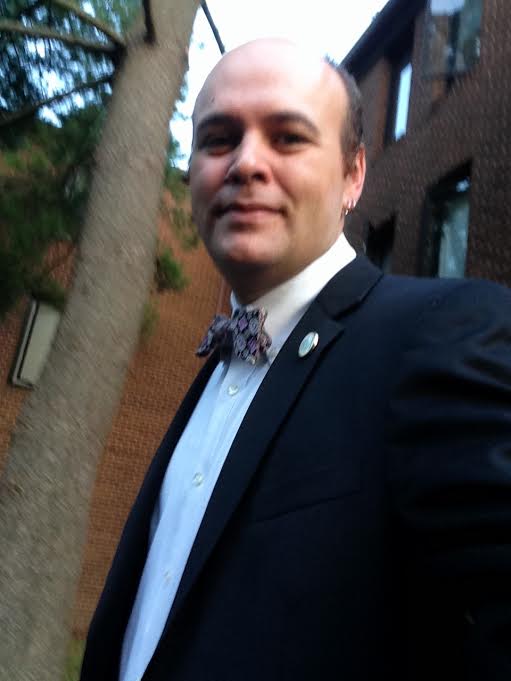Podcast: Play in new window | Download
Subscribe: Apple Podcasts | RSS
Dr. Josh Drew is a Lecturer in the Department of Ecology, Evolution and Environmental Biology and Director M.A. in Conservation Biology Program at Columbia University. He received his M.S. degree in Biodiversity, Conservation, and Public Policy from the State University of New York at Albany and his PhD from the Boston University Marine Program. Afterward, he conducted postdoctoral research at the Field Museum in Chicago and served as an Adjunct Professor at East West University in Chicago before joining the faculty at Columbia. Josh is here with us today to tell us all about his journey through life and science.
People Behind the Science Podcast Show Notes
Life Outside of Science
Josh is a runner, and for him running is a great way to get outside and give him time to plan lectures and think through problems. He also likes to listen to Star Trek-based podcasts and read classic comic books from the ’60s and ’70s.
The Scientific Side
His science focuses on marine biodiversity in the tropics. Josh is a conservation biologist studying how diversity is generated, why diversity matters, and what we can do to keep diversity around for many more generations.
A Dose of Motivation
“In the fields of observation chance favors only the prepared mind.” By Louis Pasteur
What Got You Hooked on Science?
As a kid, Josh remembers playing in the woods with his grandmother over summer vacations and going on hikes with his dad in the Adirondack Mountains near their home in Albany, NY. He loved being outdoors. In undergrad, Josh was delighted to find he could take whole courses that involved learning about and being out in nature. His passion for marine biology was ignited during a thrilling scuba dive on the Mesoamerican Reef in Mexico during a semester abroad.
The Low Points: Failures and Challenges
The job market is difficult for scientists. Josh graduated in 2008 with his PhD and was lucky to find a postdoc afterward, but really struggled to find a permanent position. He applied for about 75 positions before he was offered his job at Columbia, and that was a lot of rejection to deal with. Finding a job was overwhelming at times, and he was able to get through by breaking down the task into achievable, incremental steps.
A Shining Success!
Josh recently had a paper published on how teachers can use technology in the classroom to expand the classes in time, space, and diversity. This has the potential to make STEM fields more welcoming and inclusive for groups who have been shut out of them in the past. Josh talks about how he likes to use social media in the classroom to bring in a diversity of voices and opinions.
Book Recommendations
Twenty Love Poems and a Song of Despair by Pablo Neruda, The Black Unicorn Sings by Aja Monet, Bad Feminist: Essays by Roxanne Gay, Flight Ways: Life and Loss at the Edge of Extinction by Thom van Dooren
Most Treasured Travel
Savusavu is a beautiful small town in Fiji that is Jeff’s favorite place in the world. He is fond of the great harbor, the cosmopolitan feel, the friendly people, the excellent hot springs, and the surprisingly good pizza. It is a surreal experience to walk into town early in the morning, shrouded in hot spring mists, to watch the sun rise over the mountaintops. Josh has traveled through Savusavu many times to get to his field site nearby, and he has dreams of retiring to this picturesque town.
Quirky Traditions and Funny Memories
Josh is adamant about taking time to celebrate successes and accomplishments. His lab has a tradition of going out for celebratory milkshakes whenever there are papers published, grants awarded, students graduating, or other happy moments. Another tradition Josh and his colleagues enjoy started with a conversation about a less-than-attractive painting in his PhD advisor’s office with the words “Vivid Splendor” on it. They now try to incorporate the phrase “vivid splendor” in all of their presentations and papers as an inside joke.
Advice For Us All
Don’t worry about things over which you have no control. Also, there is always some beauty to be found in nature. You just need to stop and look for it.
Guest Bio
Josh is a lecturer in Conservation at Columbia University where he also directs their MA in Conservation Biology program. A marine biologist by training his research looks into the evolution, ecology and conservation of Pacific coral reefs. A student of natural history, he has published widely on the application of traditional ecological knowledge to conservation efforts and on how historical ecology can help inform current management. He is an advocate for diversity in STEM fields as well as being a both a bow tie and a milkshake aficionado.

Leave a Reply